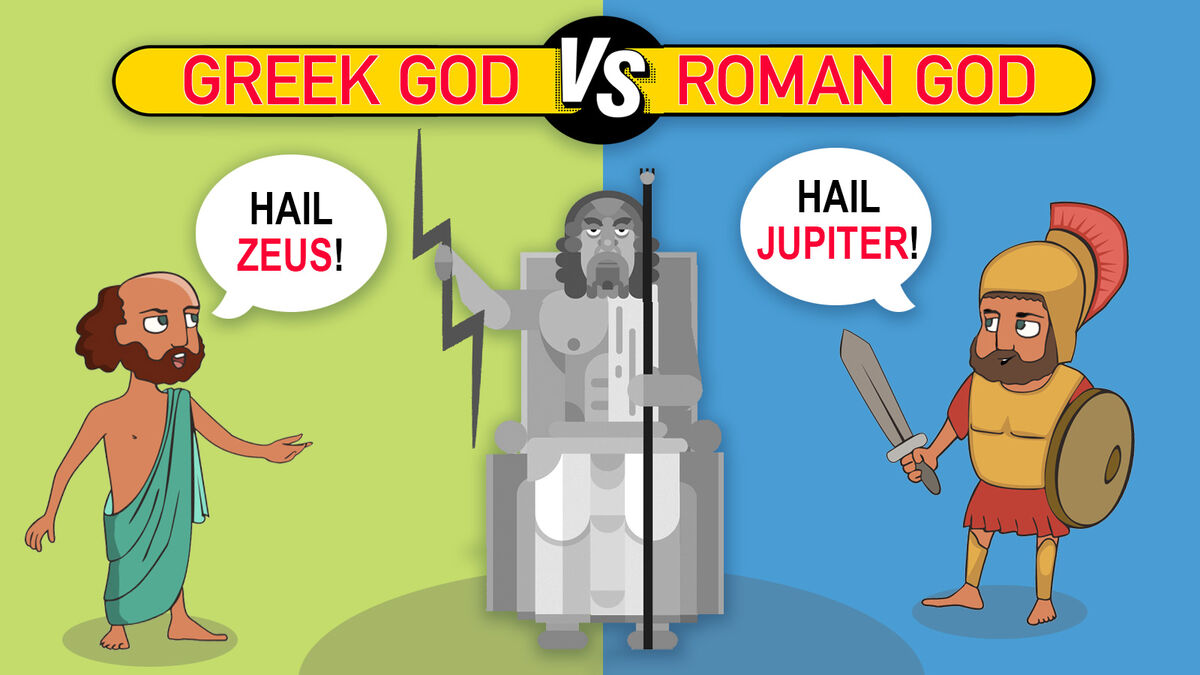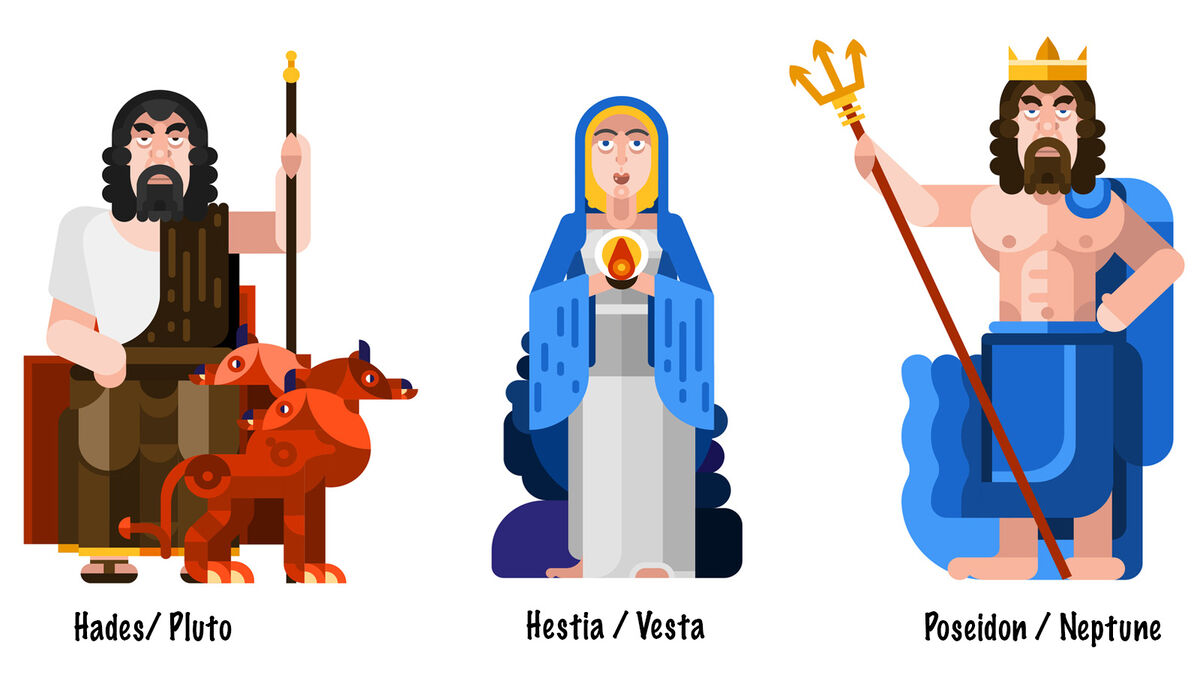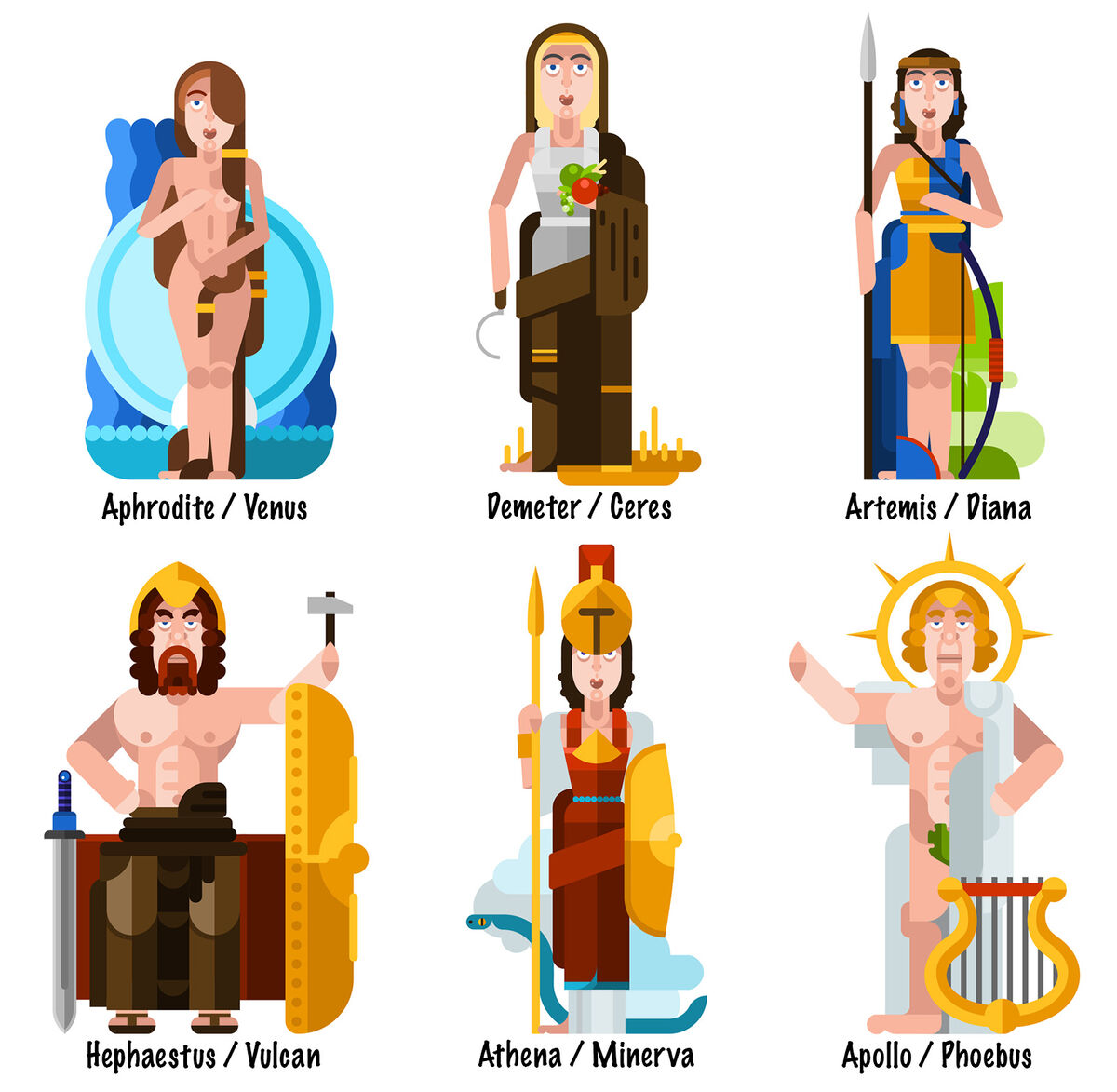
You may know that the major Greek gods and goddesses are also represented in Roman mythology with different names. But are these immortal figures really the same in Greek and Roman cultures? Keep reading to learn all about these gods and goddesses and how they differ between ancient cultures.
Comparing Greek and Roman Gods
Even though Greek gods predate Roman gods by over 1,000 years, both cultures use mythology to understand the world around them. Greeks and Romans often established societal norms with mythological stories, as gods were not perfect in behavior or personality.
But unlike the Greeks who worshipped the 12 gods of Olympia, Rome worshipped thousands of different gods. They added gods with desirable attributes to their pantheon as they expanded the Roman Empire across the world. When Rome reached Greece, they adopted all 12 gods, changed their names to Roman names, and gave them more traditional Roman personalities.
Check out these additional similarities and differences between Greek and Roman gods.
Greek God | Roman God | Similarities | Differences |
Apollo | Apollo/Phoebus | God of sun, light, and music | Apollo is also known as Phoebus and has a more imperial role in Roman culture. |
Ares | Mars | God of war and battle | Mars, originally god of agriculture, was Rome’s protector, while Ares was deadly to everyone, including Greeks. |
Chronos/Cronus | Saturn | God of time, King of the Titans | Saturn is the Roman god of seasons and sowing seeds; Rome gave Saturn (father of Jupiter) the same genealogy as Chronos (father of Zeus). |
Dionysus | Bacchus/Liber | God of wine, vegetation, and intoxication | Dionysus is also the Greek god of religion (“spiritual intoxication”). |
Eros | Cupid | God of love | Eros is the god of all love, but Cupid is the god of romantic love and lust. |
Hades | Pluto | God of the dead/underworld | Pluto is derived from the Greek plouton meaning “rich,” he collects wealth under the ground, while Hades is more foreboding. |
Hephaestus | Vulcan | God of weaponry and metallurgy | Vulcan controls volcanic fire and eruptions. |
Hermes | Mercury | Messenger of the gods | Hermes is more of a trickster and thief than Mercury. |
Neptune | God of the sea and horses | Neptune was originally the god of freshwater, as the Roman Empire was landlocked for a period of time. | |
Zeus | Jupiter | King of the gods, God of the sky | Zeus often interfered with mortal life on Earth; Jupiter was also the god of victory. |

Greek and Roman Goddesses
Both Greek and Roman cultures worshipped powerful goddesses as well as gods. Their origin stories and roles are often very similar to each other, but each goddess in Greek culture is a bit different than her Roman counterpart. Here are some ways to tell the difference between them.
Greek Goddess | Roman Goddess | Similarities | Differences |
Aphrodite | Venus | Goddess of love and beauty | Venus is also the goddess of fertility and prostitution. |
Artemis | Diana | Goddess of the hunt and the moon | Diana is also the goddess of witchcraft and femininity. |
Athena | Minerva | Goddess of wisdom | Athena is also the goddess of war. |
Demeter | Ceres | Goddess of the harvest | Ceres is also the goddess of grains and she administers rites of the dead. |
Gaia | Terra/Terra Mater | Goddess of Earth | Gaia is a primordial Earth goddess who gave birth to ancient gods. |
Hera | Juno | Queen of the gods, Goddess of marriage and birth | Hera is depicted as vengeful toward her husband Zeus’s lovers, while Juno is more merciful toward Jupiter’s lovers. |
Hestia | Vesta | Goddess of the hearth and family | Vesta is also the Roman goddess of altars. |
Persephone/Kore | Proserpina | Goddess of the dead/underworld | Persephone is also goddess of the changing seasons; Proserpina is goddess of springtime. |

Depictions of Gods in Ancient Poems
Both Greek and Roman gods and goddesses can be traced to ancient poetry. One of the earliest depictions of these gods and goddesses was in Homer’s epic poem The Iliad, written between 1260 and 1180 BC. The poem discusses the immortals’ roles in the Trojan War as they intervene to bring Achilles on his rightful journey.
The Aeneid, a Latin epic poem written by Virgil over 1,000 years later, tells the story of Aeneas, a character in The Iliad and the ancestor of all Romans. Roman gods and goddesses play an important role in this poem as well. They influence other immortals to act in (or against) Aeneas’s best interests in his voyage.
Modern Influence of Greek and Roman Mythology
Greek myths helped to explain everyday phenomena in the ancient world. The Roman adaptation of Greek mythology influences our everyday life, from the planets in the universe to the months in our calendar. Learn more about how Greek mythology influenced the modern English language, or check out these legendary creatures from Greek myths. If you want to learn even more about ancient Greece, explore its 4 types of governments.